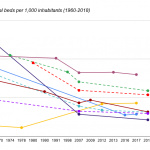- Out of the wild. [The New Atlantis] “The ideal of nature as it used to be before human intervention is one that Western urbanites created in the late nineteenth century, chiefly as a foil for their own modernity… This vision still permeates much of environmentalism and stands in the way of responsible action toward nature, particularly in the places where we actually live.”
- Minds on Fire: Cognitive Aspects of Early Firemaking and the Possible Inventors of Firemaking Kits. [Cambridge Archaeological Journal] “We analyse aspects of the two main hunter-gatherer firemaking techniques—the strike-a-light and the manual fire-drill—in terms of causal, social and prospective reasoning.”
- The Kayak’s Cultural Journey. [Craftsmanship Quarterly] “For millennia, Indigenous peoples across the world have built and used skin boats to fish and hunt, for sport and travel, even for warfare. Now non-Indigenous admirers of the craft are making them, too.”
- Permacomputing Aesthetics: Potential and Limits of Design Constraints in Computational Culture. [LIMITS 2023] “Permacomputing is a nascent concept and a community of practice oriented around issues of resilience and regenerativity in digital technology. At the heart of permacomputing are design principles that embrace limits and constraints as a positive thing, as well as being creative with available computational resources.”
- Building and Monitoring a SolarPowered Web Server. [ETH zürich] “In this thesis we focus on building a solar-powered web server. We present existing websites which are fully or partially solar powered, introduce some background about battery state of charge estimation and how to determine the right solar panel and battery size. Reusing components from older projects, we host a static website on an exemplary setup, which is solely solar powered.
No Tech Reader #40
Last Child in the Woods
“The remarkable collapse of children’s engagement with nature – which is even faster than the collapse of the natural world – is recorded in Richard Louv’s book Last Child in the Woods, and in a report published recently by the National Trust. Since the 1970s the area in which children may roam without supervision has decreased by almost 90%. In one generation the proportion of children regularly playing in wild places in the UK has fallen from over half to fewer than one in ten. In the US, in just six years (1997-2003) children with particular outdoor hobbies fell by half. Eleven to 15 year-olds in Britain now spend, on average, half their waking day in front of a screen. The young people we might have expected to lead the defence of nature have less and less to do with it.” Read more.





